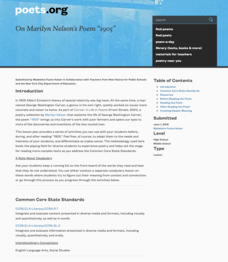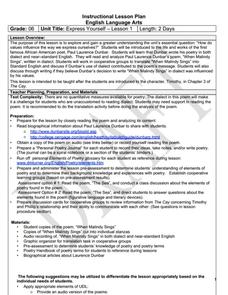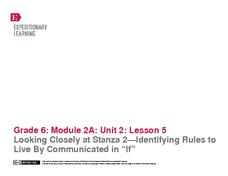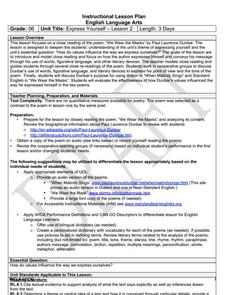Academy of American Poets
Teach This Poem: “In This Place (An American Lyric)” by Amanda Gorman
Amanda Gorman, the United States's first National Youth Poet Laureate, is featured in a resource from the Academy of American Poets. Class members first read Dr. Martin Luther King, Jr.'s "I Have A Dream" speech and note what King wanted...
Academy of American Poets
Teach This Poem: “One day is there of the series” by Emily Dickinson
A activity begins with learners saying three words they associate with Thanksgiving dinner. They examine a picture of a menu from a Thanksgiving meal and discuss what they believe the artist wants them to feel, pointing out details....
Academy of American Poets
Teach This Poem: “As I Walk These Broad Majestic Days” by Walt Whitman
Walt Whitman's poem "As I Walk These Broad Majestic Days" offers scholars an opportunity to practice their noticing skills. They first examine a postcard of the Newport News Shipyard listing things they notice about the image and how...
Academy of American Poets
Teach This Poem: "The Tradition" by Jericho Brown
To begin this lesson, class members examine Antonius Hockelmann's painting "Tree Flowers II," record elements of the painting that they notice, and share their observations with a partner. Next, pupils do a close reading of Jericho...
Academy of American Poets
Teach This Poem: "Violin" by Nikki Wallschlaeger
Nikki Wallschlaeger's Violin is the featured poem in a instructional activity that uses music and multiple readings to delve deep into its analysis. After a writing warm-up, learners watch and listen to a video that showcases Regina...
Academy of American Poets
On Marilyn Nelson's Poem “1905”
Marilyn Nelson's poem, "1905," asks young scholars to compare and contrast George Washington Carver and Albert Einstein. After studying images of the two scientists and listing their observations, class members listen to several readings...
Curated OER
6th Grade: Express Yourself, Lesson 1: Poem
While originally created to accompany The Cay, this poetry lesson could be used on it's own, especially if you are working on dialect. Class members conduct a close reading of "When Malindy Sings" by Paul Laurence Dunbar and listen to an...
Academy of American Poets
Teach This Poem: "Maps" by Yesenia Montilla
After examining a physical map of the world, learners conduct a close reading of Yesenia Montilla's poem "Maps." They note the interesting words and phrases, the way the poem is structured, and list questions they might have. After...
National Endowment for the Humanities
“The Great Migration” by Minnie Bruce Pratt
Minnie Bruce Pratt's poem, "The Great Migration," offers young scholars an opportunity to reflect on how where we come from influences who we are. Groups conduct a close reading of the poem, recording observations about the poem's...
National Endowment for the Humanities
“Every Day We Get More Illegal” by Juan Felipe Herrera
A study of Jan Felipe Herrera's poem "Every Day We Get More Illegal" opens the door for a discussion on immigration. To begin, class members examine the photograph "Desert Survival," record their observations of the image, and then...
EngageNY
Introducing “If” and Noting Notices and Wonders of the First Stanza
After reading chapter 14 of the story Bud, Not Buddy by Christopher Paul Curtis, scholars take part in a read-aloud of the poem If by Rudyard Kipling and compare it to the reading of Bud, Not Buddy. Learners then go deeper into the poem...
EngageNY
Notices, Wonders, and Vocabulary of the Third Stanza of “If”
How does one's experience reading a poem's text differ from listening to its audio version? Delve into the insightful question with the poem, If by Rudyard Kipling, as pupils compare and contrast their experience using a note-taking...
EngageNY
Looking Closely at Stanza 3—Identifying Rules to Live By Communicated in “If”
Just as Bud, from the novel Bud, Not Buddy by Christopher Paul Curtis, had rules to live by, so does the poem, If by Rudyard Kipling, but how do the two relate? Pupils delve deep into the poem's third stanza, participate in a grand...
Scholastic
Reading Poems From the Academy of American Poets Chancellors
Start a lesson on poetic voice with a peer to peer discussion on what characterizes the strength in the voice with which a writer chooses to express himself/herself. In pairs, readers are tasked with reading and creating T-charts for...
Scholastic
Lesson Two: The Earth, Introductory Activities
Determine what young pupils already know about earth science with a brainstorming activity. After class members work together to complete a KWL chart about the Earth, they craft an acrostic poem to demonstrate their understanding.
Academy of American Poets
The Immigrant Experience
The Buttonhook by Mary Jo Salter is the focus of a unit that explores the immigration experience to Ellis Island. First, scholars bring in an artifact that represents their heritage. A group-exercise allows them to share and discuss...
EngageNY
Looking Closely at Stanza 1—Identifying Rules to Live By Communicated in “If”
Here is a lesson plan in which pupils connect themes and rules to live by from the story Bud, Not Buddy by Christopher Paul Curtis to those found in the poem If by Rudyard Kipling. First, scholars discuss their reading and review Bud's...
EngageNY
Notices and Wonders of the Second Stanza of “If”
Here is an instructional activity that asks pupils to analyze poetry and sparks discussion about two different types of texts: asking how is the poem, If by Rudyard Kipling alike and different from the story, Bud, Not Buddy by...
EngageNY
Looking Closely at Stanza 2—Identifying Rules to Live By Communicated in “If”
Pupils take part in a close reading of the poem, If by Rudyard Kipling, in which they delve deep into its meaning and identify its rules to live by. As the grand discussion progresses, learners then relate the poem's rules with those...
Curated OER
Life Reflections in Songwriting and Poetry
Learners analyze, discuss and compare sources of inspiration, use of words and imagery, and other differences in writing styles between two featured songwriters. This is an introductory lesson to a creative project unit.
Denver Art Museum
Putting Images into Words
Engage your class in art analysis of Indian Look-Alike by Melanie Yazzie. Using this work of art as inspiration, writers compose a poem or short story. After a peer review session, the teacher conveys information about the work of art as...
Curated OER
6th Grade: Express Yourself, Lesson 2: Close Read
The second activity of a pair about Paul Laurence Dunbar, this plan focuses in particular on his poem, "We Wear the Masks." After a short historical introduction, class members conduct a series or readings, marking up the text and...
National Endowment for the Humanities
The Poet's Voice: Langston Hughes and You
Middle schoolers complete a unit of lessons that explore the poetic voice of Langston Hughes. They define voice, read and analyze various poems by Langston Hughes, and complete journal entries for each instructional activity.
Angel Island Immigration Station Foundation
Culminating Writing Project - Reporting on Angel Island
The unit study of Angel Island Immigration Station concludes with scholars using information from the previous lessons to craft a news story about the Angel Island program.

























